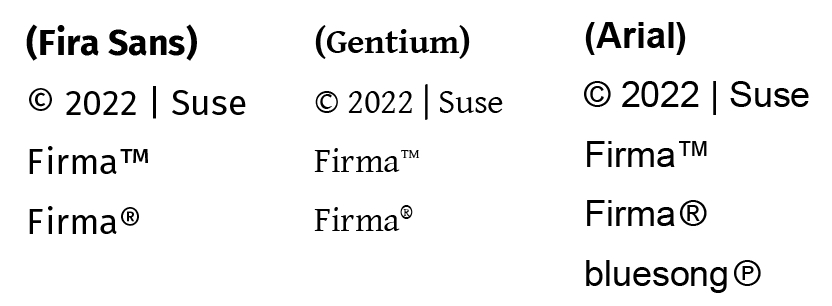The copyright sign does not automatically create copyright. We explain what the copyright sign, trademark and registered trademark mean and show how they are used in a typographic context.
Symbols for copyright such as the copyright signs © and ℗, but also the signs for trademark law such as ® and ™ originate from the Anglo-American legal system. Under German law, they partly have no meaning and are only used for marketing purposes.
Copyright sign – a sign for copyright
The copyright sign is the c in a circle ©. It is used in copyright law to identify a work such as a photograph, music or a website. The sign originated in the United States, but lost its legal necessity there about 30 years ago.
In Germany, the copyright sign is used to identify works protected by copyright, but under German law its use has no significance for copyright protection. The author is not obliged to mark his trademark application. So anyone who thinks they are protecting their website with a copyright sign is mistaken. And anyone who does not add the © to his copyrighted image still retains his copyright. The work is protected by copyright the moment it is created.
In practice, however, it makes sense to add the copyright sign to one’s works, such as one’s own photograph. Because in the event of a dispute, the author does not have to laboriously prove that the idea robber could have known this.
Writing order
The recommended order is this:
© 2022 | Marie Musterwiese | Berlin
Since the C stands for the word copyright, one should refrain from using a spelling like the following:
Copyright © Marie Musterwiese
Also, superscripting the © is not correct. In some fonts it is basically slightly off-centre at the top. The character is separated from the following text, usually the year, with a (protected) word space.

Keyboard layout
Copyright © for Mac: Key combination Dial + G.
Copyright © for Windows: key combination Alt + 0169 or Unicode U + 00A9.
Sound Recording Copyright sign or Phonogram
The Sound Recording Copyright represents the copyright symbol for sound recordings or phonograms. It is represented by a P in a circle, which stands for Phonogram. Strictly speaking, phonographic rights include the rights to sound and video recordings and to sound and video carriers. It is used to designate the rights to one’s audio recordings. Musical copyright consists of several components and is complex; anyone who wants to be safe on the road here should consider legal advice.
Writing
Copyright for sound recordings is not included in every writing. It is placed – if present – directly after the last character. If it is relatively large, half a word space can also be placed in between.

Keyboard layout
Phonogram ℗ for Windows: key combination Unicode U + 2117.
Registered Trademark – the registered trademark
The R sign, i.e. the ® symbol, is a capital R in a circle. It also originates from the trademark law of the USA and is intended to show that it is a registered trademark. In this context, the trade mark may not only be applied for, but must also be entered in the trade mark register.
In German trade mark law, it is permitted, but not mandatory, to affix the R mark to a registered trade mark. The reasons for using it are therefore not legal, but rather lie in advertising and external impact. By using the ® you want to deter imitators and give your product a certain uniqueness. Make sure that you only use the registered sign for products or services for which the trade mark is also registered. Otherwise, you may be accused of violating the Unfair Competition Act.
Keyboard layout
Registered ® for Mac: Key combination Alt + R.
Registered ® for Windows: key combination Alt + 0174 or Unicode U + 00AE.
Trademark – the sign for trademark
One legal step ahead of the ® is the TM mark, pronounced Trademark, the sign for which is ™. In American law, this is used to mark products or services that have already been registered as a trademark but have not yet been entered in the official register. In principle, caution must be exercised when using the TM mark. German jurisdictions have ruled differently on the use and also on the alleged misleading nature of the TM mark in recent years.
Spelling
The ™ and also the ® are superscripted, reduced in size and placed after the last character without spacing. As a rule, the character size is 50-60 per cent of the font size. Depending on the font and the font size, it is advisable to adjust the size and position of the characters so that they remain recognisable on the one hand, but do not become too dominant visually on the other.
Keyboard layout
Trademark ™ for Mac: key combination Alt + Shift + D.
Trademark ™ for Windows: key combination Alt + 0153 or Unicode U + 2122.
Font variations
Depending on the font chosen, the size as well as the y-placement of copyright signs and co. may vary. In any case, you should make sure that the characters can be recognised even in small sizes.

Image source: Bored Photography via Shutterstock


